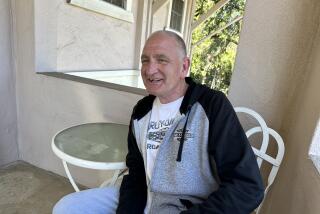After ‘Horrible’ Wait, Drug Treatment Taking Hold
- Share via
SANTA ANA — When Phoenix House accepted Jenny Bozoff for treatment, she was put on a three-month waiting list and told to call in daily. For someone who regularly spent $140 to $400 a day on rock cocaine and heroin, it wasn’t the instant gratification she was used to.
“No one said, ‘Come on down,’ ” she recalled. “I really expected someone would be there right away to help me, but it doesn’t work that way.”
Bozoff, a blond 31-year-old, never failed to check in and eventually made it into the 15-month program at the county’s old juvenile hall on East Fruit Street. She is now in her 13th month of treatment and doing well.
But things used to be worse, especially during the two months between acceptance and admission to Phoenix House, which she called “the most horrible part of my life.”
Bozoff’s parents, John and Patty, said they knew something “drastic” had to be done for their daughter when she showed up thin and pale at their doorstep on Thanksgiving, 1988, after she lost everything--job, car and health.
“She was knocking at death’s door,” Patty Bozoff said. “She wished she could disappear and stayed in bed for days and days. She used to tell me, ‘Mom, I’m so humiliated.’ ”
One of her sisters found out that Phoenix House, which uses a combination of intense counseling, discipline and job training, was one of the most effective drug treatment centers in the county. Surveys show that roughly 80% of those who finish the program stay clean.
During the period Bozoff was waiting to enter the treatment center, she couldn’t even begin to break her 14-year addiction, and her drug use continued unchecked.
“I stole my mother’s jewelry. I ran outrageous tabs at bars and nightclubs with my parents’ credit cards to pay my connections,” Bozoff said. “I lied, dealt drugs and manipulated more so than ever before.”
Her mother said that at home her daughter used to take anything in the medicine cabinet that would get her up or down. If she had a cold, she would drink as much cold medicine or cough medicine as she could, to get the feeling of being on something.
“The wait was the hardest time of all,” Patty Bozoff said. “It was terrible. Something happens to them during this waiting period--futility--and every day I went to work, I didn’t know what condition she would be in when I came home.”
The weeks went by, and the longer Bozoff waited, the more she said she didn’t want to get into the program. Things seemed to get better for her. She recalled that she had found another job and developed a good relationship with her boyfriend.
When a spot finally became available at Phoenix House, Bozoff said, “I didn’t want to come. I was scared I’d never get to party again. My parents thought it was the best day of my life. I thought it was the worst. But I just made myself do it.”
Although Bozoff has been in the program slightly more than a year, her mother can recall without hesitation the day her daughter entered it--Jan. 24, 1989. “I remember I couldn’t breathe that day. I just waited on the bed at night saying she had left. I didn’t sleep well. Now, we expect she probably will be out soon to get a job.”
More to Read
Sign up for Essential California
The most important California stories and recommendations in your inbox every morning.
You may occasionally receive promotional content from the Los Angeles Times.











